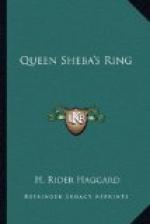Orme turned white as a sheet and gazed at him steadily. Then a strange look came into his grey eyes, almost a look of inspiration.
“Prince Joshua,” he said in a very quiet voice, “who knows what may happen before the sun rises thrice on Mur? All things that begin well do not end well, as I have learned, and as you also may live to learn. At least, soon or late, your day of reckoning must come, and you, too, may be betrayed as I have been. Rather should you ask me to forgive your soul the insults that in your hour of triumph you have not been ashamed to heap upon one who is powerless to avenge them,” and he urged his camel past him.
As we followed I saw Joshua’s face turn as pale as Oliver’s had done, and his great round eyes protrude themselves like those of a fish.
“What does he mean?” said the prince to his companions. “Pray God he is not a prophet of evil. Even now I have a mind—no, let him go. To break my marriage vow might bring bad luck upon me. Let him go!” and he glared after Oliver with fear and hatred written on his coarse features.
That was the last we ever saw of Joshua, uncle of Maqueda, and first prince among the Abati.
Down the pass we went and through the various gates of the fortifications, which were thrown open as we came and closed behind us. We did not linger on that journey. Why should we when our guards were anxious to be rid of us and we of them? Indeed, so soon as the last gate was behind us, either from fear of the Fung or because they were in a hurry to return to share in the festivities of the approaching marriage, suddenly the Abati wheeled round, bade us farewell with a parting curse, and left us to our own devices.
So, having roped the camels into a long line, we went on alone, truly thankful to be rid of them, and praying, every one of us, that never in this world or the next might we see the face or hear the voice of another Abati.
We emerged on to the plain at the spot where months before we had held our conference with Barung, Sultan of the Fung, and where poor Quick had forced his camel on to Joshua’s horse and dismounted that hero. Here we paused awhile to arrange our little caravan and arm ourselves with the rifles, revolvers, and cartridges which until now we had not been allowed to touch.
There were but four of us to manage the long train of camels, so we were obliged to separate. Higgs and I went ahead, since I was best acquainted with the desert and the road, Oliver took the central station, and Roderick brought up the rear, because he was very keen of sight and hearing and from his long familiarity with them, knew how to drive camels that showed signs of obstinacy or a wish to turn.
On our right lay the great city of Harmac. We noted that it seemed to be quite deserted. There, rebuilt now, frowned the gateway through which we had escaped from the Fung after we had blown so many of them to pieces, but beneath it none passed in or out. The town was empty, and although they were dead ripe the rich crops had not yet been reaped. Apparently the Fung people had now left the land.




